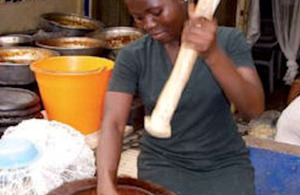DFID Research: reducing the health risk of street food in Ghana
Food hygiene training helps street vendors serve safer food.

Making fufu. Picture: John Esser/NR International
A collaborative food hygiene research project funded by DFID’s Crop Post-Harvest Programme has helped street vendors in Accra, Ghana to attract more customers and earn more money.
60,000 people, mostly women, earn a good living selling convenience food favourites such as fufu (usually cassava that has been cooked, pureed, and mashed into a ball), banku (fermented corn dough) and kenki (maize puree). The ‘street food’ is cheaper than food in a restaurant, but there are dangers. Poor hygiene means that food is often contaminated, and when customers fall ill, a vendor’s clientele - and livelihood - can vanish. The city suffers too, as vendors contribute £100 million each year to Accra’s economy. What’s more, those who rely most on ‘street food’ tend to be the poorest - those who can least afford to get ill.
The research showed that some foods - fufu in particular - were more easily contaminated than others, and that some vendors’ traditional cooking pots contained dangerous amounts of heavy metals such as lead. These research results led to the development of vendor education training supported by a coalition of street vendor NGOs, local authorities, food standards authorities, research institutions, and food laboratories. The main priorities for vendor education were to wash pots in running water, separate raw from cooked food, to keep food hot, and to make vendors aware that improved hygiene attracts more customers and can help them earn more money.
The project has directly trained 300 vendors, with another 3,000 trained by vendors’ associations. This successful approach is now being extended to informally vended food in Zambia, Zimbabwe and India.